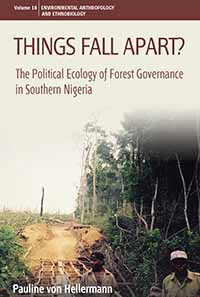
Series
Volume 18
Environmental Anthropology and Ethnobiology
Email Newsletters
Sign up for our email newsletters to get customized updates on new Berghahn publications.
Things Fall Apart?
The Political Ecology of Forest Governance in Southern Nigeria
Pauline von Hellermann
206 pages, 17 illus., 4 maps, bibliog., index
ISBN 978-0-85745-989-3 $135.00/£104.00 / Hb / Published (September 2013)
eISBN 978-0-85745-990-9 eBook
Reviews
“Von Hellermann’s book is a clear and useful reading not just in anthropology and political ecology, but also for development and environmental practitioners, stressing the importance of historical analysis in understanding and deconstructing common narratives on crisis.” · Social Anthropology/Anthropologie sociale
“This is an excellent contribution to the literature on political ecology in Africa.” · Bayo Ijagbemi, University of Arizona
“This is an important book that has much to say about forest politics that is relevant not only within the regional context of West Africa but throughout the tropics. The detailed history and analysis of interactions between local economic and political systems and the standard European forestry regimes that were imposed in colonial times provides insights that resonate with accounts from tropical forest areas across the world.” · Helen Newing, University of Kent
Description
Governance failure and corruption are increasingly identified as key causes of tropical deforestation. In Nigeria’s Edo State, once the showcase of scientific forestry in West Africa, large-scale forest conversion and the virtual depletion of timber stocks are invariably attributed to recent failures in forest management, and are seen as yet another instance of how “things fall apart” in Nigeria. Through an in-depth historical and ethnographic study of forestry in Edo State, this book challenges this routine linking of political and ecological crisis narratives. It shows that the roots of many of today’s problems lie in scientific forest management itself, rather than its recent abandonment, and moreover that many “illegal” local practices improve rather than reduce biodiversity and forest cover. The book therefore challenges preconceptions about contemporary Nigeria and highlights the need to reevaluate current understandings of what constitutes “good governance” in tropical forestry.
Pauline von Hellermann is Lecturer in Anthropology at Goldsmiths, University of London. She has conducted research on landscapes and politics in Nigeria and Tanzania and is editor of Multisited Ethnography: Problems and Possibilities in the Translocation of Research Methods (with Simon Coleman, Routledge, 2011).




